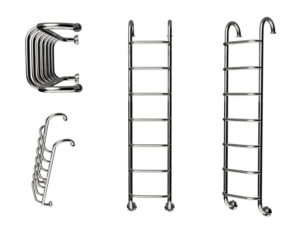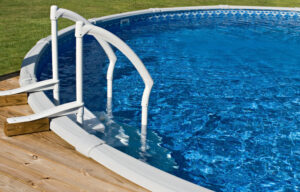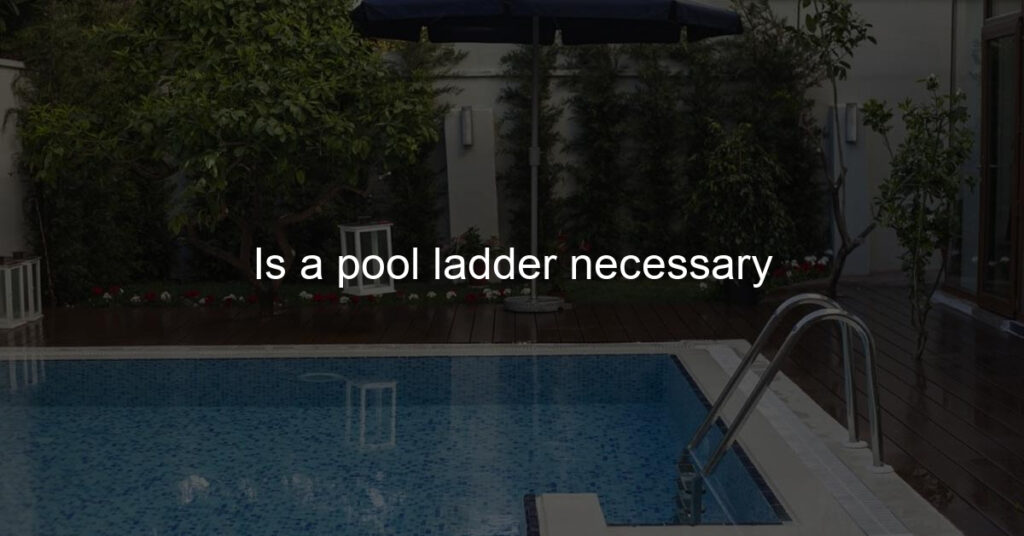Is A Pool Ladder Necessary
Have you ever tried climbing out of a swimming pool without a ladder? It can feel like trying to scale the side of a slippery mountain.
In the world of swimming pools, there’s an often overlooked component that many people underestimate in terms of its importance: the pool ladder. Is it merely an optional accessory or an absolute necessity?
In this article, we delve into the pros and cons of having a pool ladder, the safety issues it addresses, and the effect it has on the overall swimming experience.
Prepare to dive deep into the world of pool equipment as we answer the question: Is a pool ladder truly necessary?
The Basics of Pool Ladders: What Are They Exactly?
A pool ladder is a device that allows easy access in and out of a pool, particularly important when the pool edges are high or slippery.
They typically consist of two vertical rails, often made from rust-resistant metal or sturdy plastic, attached to horizontal rungs that create the steps. Pool ladders can be attached permanently to the pool’s edge, or they can be removable, and many come with safety features like handrails and non-slip surfaces on the steps.
While it might seem like a simple piece of equipment, the humble pool ladder plays a crucial role in pool safety and accessibility.
The Role of a Pool Ladder: A Safety Perspective

From a safety viewpoint, a pool ladder serves as an effective means to prevent accidental slips and falls while entering or exiting the pool.
This is especially crucial for older adults, children, and those with physical limitations. Without a proper ladder, there’s a higher risk of injury as people may try to hoist themselves up on the slippery edge of the pool.
Additionally, in case of an emergency, a ladder allows for a quick and safe exit, potentially preventing serious accidents.
Accessibility Considerations: Who Really Needs a Pool Ladder?
While a pool ladder might seem unnecessary for agile swimmers, it is crucial for those who may have mobility issues. This includes people with physical disabilities, the elderly, and young children who may not have the strength or balance to climb out of a pool without assistance.
Even for experienced swimmers, a ladder can make getting out of the pool a more comfortable and less strenuous process.
Therefore, from an accessibility viewpoint, a pool ladder is not just a convenience, but an essential tool.
Comparing Pool Types: Are Ladders Necessary for All?

Not all pools are created equal, and different types may have different requirements when it comes to ladders. Above-ground pools typically require ladders because their walls are high and difficult to climb over, especially from the water.
In contrast, in-ground pools often have built-in stairs or a sloped entrance which can sometimes substitute the need for a ladder.
However, even these pools may benefit from a ladder, particularly if they are deep or used by people with limited mobility.
A Deep Dive into Above-Ground Pools: The Essentiality of Ladders
In the case of above-ground pools, the necessity of a ladder is non-negotiable. These pools have high walls that are impossible to scale without a ladder, making it the primary method of entry and exit.
Moreover, above-ground pool ladders are often designed with wider steps and safety handrails to accommodate all users, including children and older adults.
Without a ladder, accessing an above-ground pool would be a daunting, if not impossible, task.
In-Ground Pools: The Debate on Ladder Necessity
In-ground pools often feature built-in steps or a gently sloping entrance, leading some to question the necessity of a ladder.
However, it’s important to consider who will be using the pool. For those with mobility issues or small children, a ladder may provide an extra level of security and ease of use.
Furthermore, a ladder provides an exit point in the deeper sections of the pool, a critical safety feature especially for less confident swimmers or in emergency situations.
Alternative Pool Entry and Exit Options: Can We Do Without Ladders?
It’s true that there are alternatives to pool ladders. These include steps, ramps, and pool lifts. While these alternatives can be useful in some cases, they may not be suitable for all types of pools or all users.
For example, steps and ramps take up more space and may not be feasible in smaller pools, and lifts can be expensive and require regular maintenance. In contrast, ladders are relatively compact, cost-effective, and simple to maintain, making them a practical choice for many pool owners.
Maintenance and Installation: The Effort Behind Pool Ladders

While a pool ladder is a valuable piece of safety equipment, it’s also worth noting that it requires regular maintenance and proper installation. The ladder must be securely attached to prevent it from tipping or coming loose, which could lead to accidents.
It also needs regular cleaning to prevent algae build-up, which can make the steps slippery. Some pool owners might see this as a downside, but with proper care, a pool ladder can provide years of safe and reliable service.
Design and Aesthetic Impact: How Pool Ladders Influence Your Pool’s Look
Pool ladders, while primarily functional, can also have an impact on the overall aesthetic of your pool. Modern designs come in a variety of styles and materials, from sleek stainless steel to rustic wood, allowing you to choose one that fits the design of your pool and backyard. However, some people feel that ladders disrupt the look of their pool. It’s a matter of personal preference, and for those who value aesthetics over functionality, alternative options like built-in stairs or invisible pool edges might be considered.
Economic Factors: Weighing the Costs of Pool Ladders
Cost is another factor to consider when discussing the necessity of pool ladders. While they represent an additional expense, pool ladders are generally not overly expensive, especially when compared to alternatives like pool lifts.
However, the cost can rise if you opt for higher-end models or require professional installation. On the flip side, the potential cost of a pool-related injury due to the absence of a ladder could far outweigh the initial investment in this safety equipment.
So, Should You Invest in a Pool Ladder?

Having weighed all aspects, it is clear that a pool ladder is more than just an optional accessory. It’s a vital safety tool that enhances accessibility, and its importance cannot be overstated, especially in above-ground pools or for users with mobility concerns.
While alternatives exist and some design or cost considerations may sway pool owners towards different solutions, the versatility, convenience, and safety provided by a well-installed and maintained pool ladder are undeniable.
Final takeaway
Investing in a pool ladder is not just about making your pool easier to use. It’s about ensuring that everyone, regardless of age or ability, can enjoy the pool safely and comfortably.
After all, a swimming pool is meant for enjoyment and relaxation, and a pool ladder helps ensure it stays that way.














